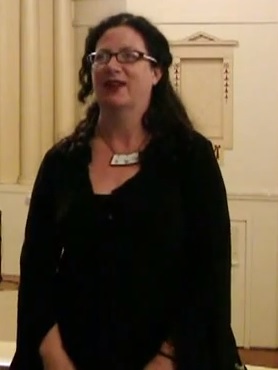Alice Gorman facts for kids
Quick facts for kids
Alice Gorman
FAHA FSA
|
|
|---|---|

Dr. Alice Gorman introduces a film at Camperdown, Australia
|
|
| Born | 1964 |
| Education | University of Melbourne University of New England |
| Occupation | Archaeologist |
Alice Gorman FAHA FSA (born 1964) is an Australian archaeologist, heritage consultant, and lecturer, who is best known for pioneering work in the field of space archaeology and her Space Age Archaeology blog. Based at Flinders University, she is an expert in Indigenous stone tool analysis, but better known for her research into the archaeology of orbital debris, terrestrial launch sites, and satellite tracking stations. Gorman teaches modern material culture studies, cultural heritage management, and Australian stone tools. Gorman is also a founding member of the Archaeology, Science and Heritage Council of For All Moonkind, Inc., a nonprofit organisation developing and seeking to implement an international convention to protect human cultural heritage in outer space.
Traditional archaeology
Gorman graduated from The University of Melbourne in 1986 with a B.A. (Hons) before working as an archaeological consultant in the Indigenous heritage management sector. She returned to study in the late 1990s and obtained a Ph.D. from The University of New England in 2001. Her doctoral thesis examined how archaeologists can identify tools used in body modification through wear and residue analysis. After graduation, she continued working as a heritage consultant until receiving a permanent academic position at Flinders University in 2005. Gorman continues to work in the Indigenous heritage management sector on short-term contracts.
Space archaeology
From an early age, Gorman wanted to be both an astrophysicist and an archaeologist. While she ended up pursuing a career in archaeology, she has reconciled the two by turning her research focus onto the archaeology of space exploration, or simply, space archaeology (for the use of satellite imagery to examine archaeological sites and landscapes, see remote sensing). In 2003, she took part in the first conference session on space archaeology at the Fifth World Archaeological Congress with John Campbell and Beth Laura O'Leary.
Since the mid-2000s, she has produced a number of publications on space archaeology and is credited for pioneering the concept of space as a cultural landscape and the application of cultural significance assessment to "space junk". Gorman not only explored "Space Race" that happened during the Cold War, she has also considered the contribution of Indigenous people to global space exploration and the archaeological signatures of this interaction.
Gorman's space archaeology research includes the oldest satellite still in orbit, Vanguard 1, the Woomera and Kourou terrestrial launch sites, and the Orroral Valley NASA Tracking Station. In 2013, Gorman received recognition for her work on the archaeology of space when she was invited to present at TEDx Sydney.
Gorman is a member of the faculty of the International Space University, an assessor for the Australian Research Council, and a member of numerous space and archaeology organisations including the Space Industry Association of Australia. She writes regularly for The Conversation, where she details much of her space archaeology research for a general audience. Her work has been included in the 2013 Science Online anthology and the collection of Best Australian Science Writing from 2013 to 2017.
In 2019, Gorman published her first book on space archaeology entitled "Dr Space Junk vs The Universe: Archaeology and the future" for which she was interviewed on the ABC's Conversations program. In December 2019, "Dr Space Junk vs The Universe: Archaeology and the future" was awarded the John Mulvaney Book Award by the Australian Archaeological Association, which recognises a significant publication on Australian Archaeology.
Awards and recognition
In 2016, Gorman was elected as a Fellow of the Society of Antiquaries of London. In 2017 she was awarded the Bragg UNSW Press Prize for Science Writing for her essay "Trace fossils: The silence of Ediacara, the shadow of uranium". In 2020, Gorman was given a Distinguished Alumni Award by the University of New England. In 2021, the Working Group on Small Body Nomenclature of the International Astronomical Union announced that asteroid 551014 Gorman, a 2-km diameter asteroid orbiting between Mars and Jupiter, was named in her honour.
In 2022, Gorman was included in a program, "The Unidentified: Are we alone in the universe?", an episode of the sensational "Under Investigation". She was elected a Fellow of the Australian Academy of the Humanities in 2023.
See also
 In Spanish: Alice Gorman para niños
In Spanish: Alice Gorman para niños

